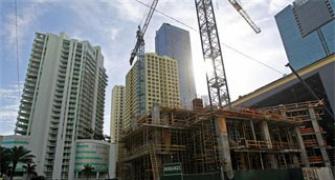 The real estate sector presents a daunting picture with revival prospects appearing to be bleak.
The real estate sector presents a daunting picture with revival prospects appearing to be bleak.
Inventories of leading firms, mostly listed, as at the end of the last financial year stand at a colossal Rs 70,000 crore or Rs 700 billion, representing 30 months' sale.
The overall picture of the sector, including the more troubled firms, will be even gloomier.
The main reason for this is that the sector players bet on a sharp economic revival with the coming in of a new government, which has not yet happened.
Additionally, the global economy is in a slowdown and the Indian economy is not immune to its adverse fallout.
The situation has been aggravated by the fact that a lot of purchases at the higher end of the market are undertaken with investment and not self-occupation or rent income in mind.
These investment decisions are typically driven by sentiment.
The builders, particularly the bigger ones, have themselves to blame as they have concentrated on the higher end of the market (which investors mostly look at) where margins are higher.
What makes the picture almost surreal is the simultaneous enormous shortage of living space in urban India.
There is a shortage of 20 million homes in the country but 11 million homes remain vacant. How imperfect the market is can be gauged from the fact that there is so little link between what is most in demand (from the poor and low income people) and what gets built. House prices are being projected to fall across the country in the current year.
If this happens, the number of firms recording negative cash flows will go far higher than those which did so last year.
As housing firms are heavily extended, a net cash deficit will make it impossible for them to service their bank loans.
The government will then be left holding the baby, if it is not already doing so, through the impact this will have on public sector banks' non-performing assets.
As the regulatory regime for real estate, including availability of land and various official levies, involves all three tiers of government, it is urgently necessary for the Union government to initiate a rapid dialogue with the states to evolve an action plan to address the imbalances in the sector.
The first item can be to reduce government levies, which account for between a fifth and a third of what the buyer pays so that price cuts can stimulate demand without unduly affecting the cash flow of real estate firms and their ability to service their bank loans.
Also vitally necessary is the need to include the sector under the proposed goods and services tax so that both buyer and seller get the benefit of set-offs on taxes paid right through the value chain.
The new regime must foremost address the need to increase the supply of low-cost and affordable housing which alone will effectively address the country's housing shortage.
This includes creating a land market, initiating single window clearance for projects (this process easily takes two years), simplifying building by-laws, particularly for low-cost housing projects, and freeing government land for mass housing.










